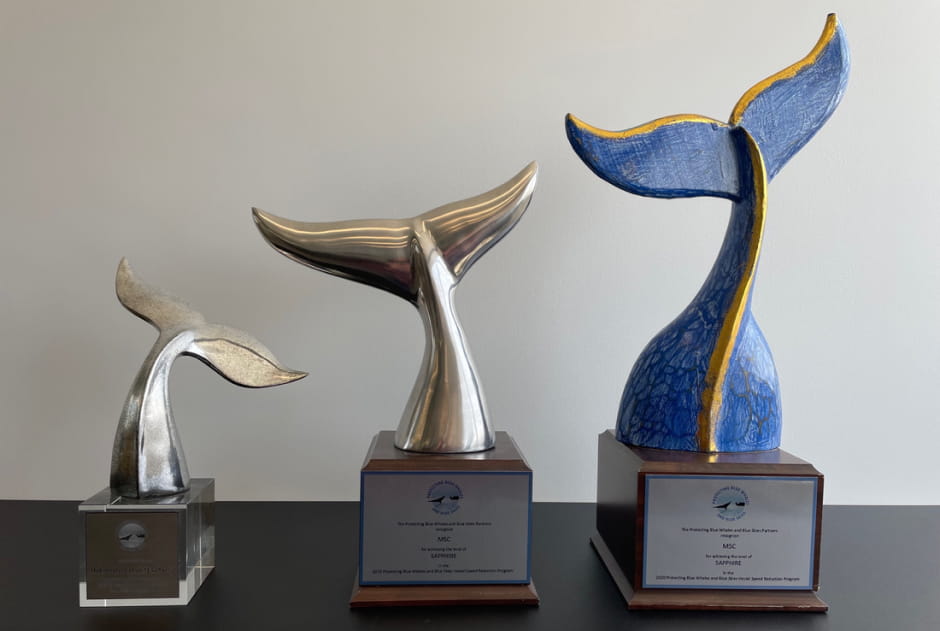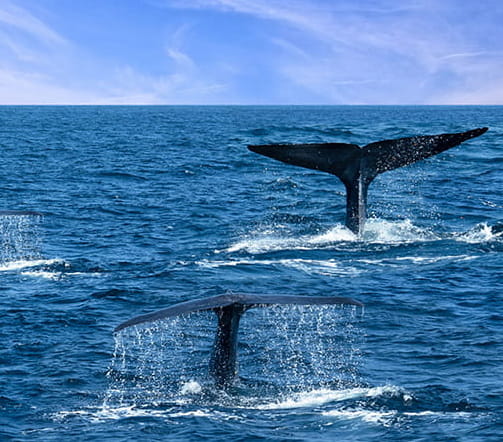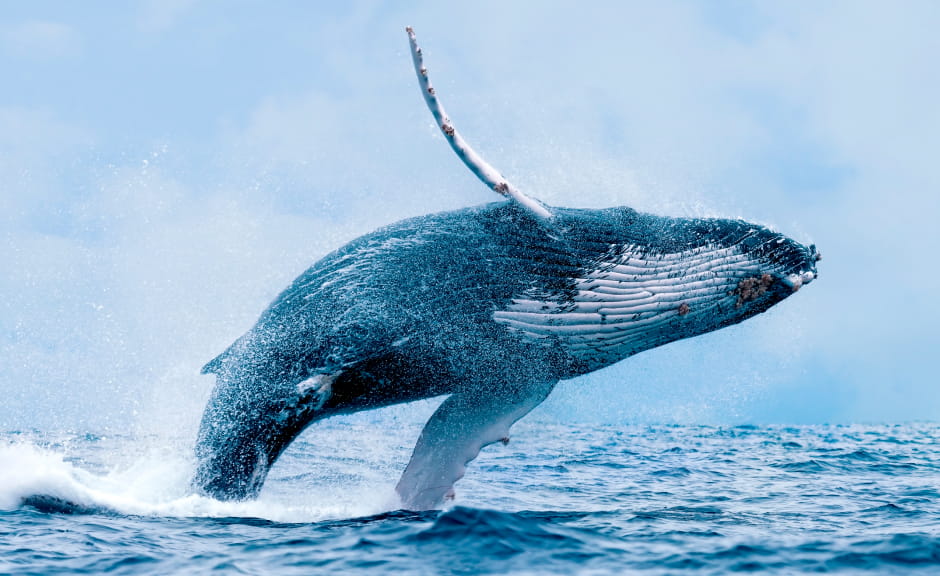

MSC Leads the Way in Protecting Endangered Whales
At the MSC Group, our deep commitment to preserving marine wildlife is rooted in our nautical heritage and position as a global leader in the maritime industry. We recognize the environmental impact ocean freight can have and are dedicated to implementing sustainable practices to safeguard marine life. A prime example of this is our proactive approach to protecting endangered species, particularly whales, which are vital to the health of our oceans.
As the Group’s shipping and logistics company, MSC Mediterranean Shipping Company (MSC) has long been at the forefront of this mission, actively working to minimize its impact on endangered whale populations. Measures include reducing speed or rerouting ships to avoid critical whale habitats and migration areas, adopting noise reduction measures into ship design, and continually advancing practices, training and technologies to protect marine life.

A Path to Sustainability: The Importance of Whale Preservation
Through their movement and feeding patterns, whales circulate nutrients that boost phytoplankton production – the microscopic algae that form the base of the marine food web. Through photosynthesis, these tiny organisms capture CO2 and produce 50 percent of the oxygen in our atmosphere. In fact, according to the International Monetary Fund, phytoplankton capture as much CO₂ from the atmosphere as 1.7 trillion trees – or about four Amazon forests’ worth).
Even at the end of their lives, whales play a crucial role in sustaining deep-sea ecosystems. As they sink to the seafloor, their bodies provide essential nutrients to marine life, while the carbon they store remains on the ocean floor removing it from the atmosphere for centuries.
Ultimately, therefore, safeguarding whales is not just about protecting a single endangered species; it is about ensuring the health of our oceans and the vital ecosystems that depend on them.

MSC Takes Action to Reroute Ships in the Mediterranean and Sri Lanka
Recognizing their importance, one key measure MSC has taken to protect whales is to reroute ships to avoid ship strikes – collisions between vessels and marine mammals, which are a significant cause of death among endangered sperm whales along the Greek coast. This region is especially high risk, with many surviving whales bearing scars from propeller injuries, and more than half of the stranded sperm whales showing evidence of collision injuries. According to Dr. Alexandros Frantzis, Scientific Director of the Pelagos Cetacean Research Institute, the number of whale deaths due to these strikes can be up to 20 times greater offshore and frequently go unreported.
To address this issue, MSC consulted with environmental non-governmental organizations (NGOs) and committed to rerouting MSC ships in Greece to avoid collisions with the remaining 200 to 300 endangered sperm whales.
Building on this, MSC also voluntarily rerouted ships by 15 nautical miles off the coast of Sri Lanka to protect endangered blue whales and other marine wildlife. The waters surrounding the southern coast of Sri Lanka are a busy shipping route for global trade and are home to large populations of aquatic creatures.
In 2023, MSC rerouted roughly 565 vessels off the coasts of Greece and Sri Lanka to protect the endangered whales. This commitment not only reduces risk to critical whale habitats but also sets a powerful example for other shipping carriers to follow suit. If all ships made a similar adjustment, it could reduce the risk of ship-strike to sperm whales by nearly 70 percent off the coast of Greece and up to 95 percent for blue whales off the coast of Sri Lanka.
MSC Takes Action to Reduce Vessel Speed and Underwater Noise
In addition to rerouting ships, MSC participates in various vessel speed reduction programmes in whale migration zones to reduce the risk of collisions. By reducing speeds to under 10 knots in sensitive areas, vessels drastically reduce the risk of accidental collisions.
As just one example, the California-based environmental protection program, Protecting Blue Whales and Blue Skies (BWBS), has awarded MSC the highest Sapphire Award for six consecutive years. The award recognises participating shipping companies for having followed voluntary speed reduction guidelines across 85-100 percent of the fleet-distance travelled in the Vessel Speed Reduction (VSR) zones of the San Francisco and Monterey Bay area and the southern California region.

Reducing vessel speed also plays a critical role in minimizing underwater noise. Whales rely on sound for things like echolocation, navigation, communication and feeding, and increased noise from ships can interfere with their ability to effectively interact with their environment.
To directly address the sound concerns, nearly one-third of MSC’s vessels are now equipped with propeller boss cap fins that lower noise levels. MSC is also actively working to incorporate the latest guidelines for reducing underwater noise from the IMO Sub-Committee on Ship Design and Construction. In addition, MSC participated in the 2023-2024 Quiet Sound voluntary vessel slowdown, achieving a 96 percent compliance rate in lowering underwater noise to help protect the 74 remaining Southern Resident killer whales.
MSC Focuses on Education and Collaboration to Protect the Whale Population
The steps to protect the endangered whales does not stop with adjusting routes and lowering vessel speeds. To further its commitment, MSC has also been exploring new technologies, such as high-resolution thermal cameras, to detect whale activity. The company also conducts a crew training programme that includes awareness raising as well as technical training for deck officers – particularly during whale breeding season.
MSC’s advocacy efforts include collaborating with organizations, such as the World Wide Fund for Nature (WWF), the International Maritime Organization (IMO) and the World Shipping Council to strengthen its practices for the betterment of the environment.
As part of its ongoing mission, MSC hosted the International Whales Protection Workshop in 2023, bringing together industry leaders to encourage collaboration and promote industry action to safeguard whales.
Protecting whales and endangered marine life continues to be a priority. By understanding our environment’s needs and taking collective action, we can make a meaningful difference. Together, as an industry, we have the power to create lasting changes that safeguard our oceans, protect marine life and preserve our blue planet.
